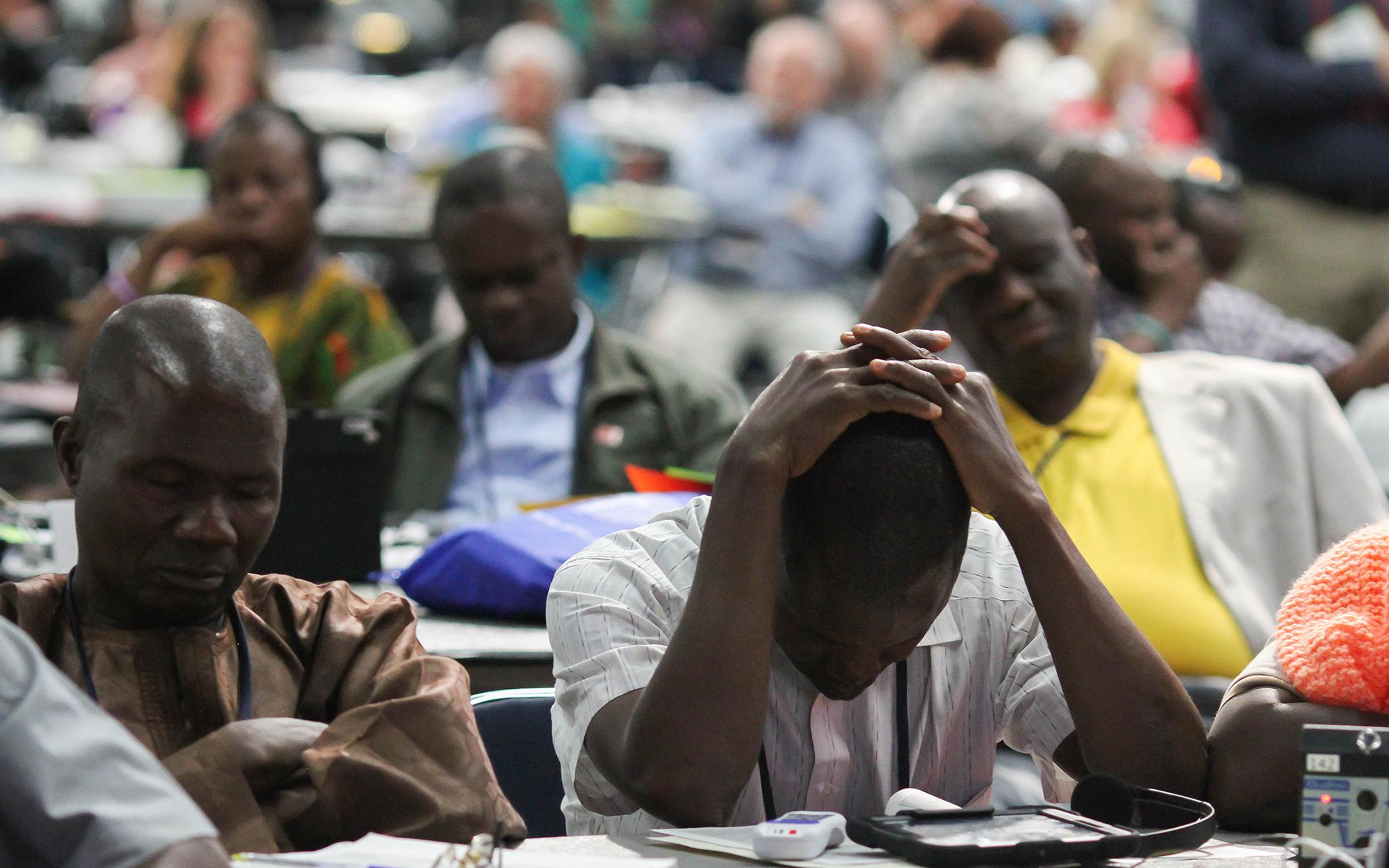The Banner has a subscription to republish articles from Religion News Service. This story by Yonat Shimron was published on religionnews.com Feb. 6, 2024. It has been edited for length and Banner style.
Karen Prudente was listening to a sermon by a United Methodist minister in a town south of Manila when she had an "Aha!" moment.
The minister was talking about how the church needed to turn the world upside down. It then dawned on Prudente, a lifelong Methodist, that it was time for the church in the Global South to have a bigger say in how things are run. A Filipino American who runs a nonprofit social-service organization in Manila, the capital of the Philippines, Prudente gathered a group of like-minded United Methodists abroad and got to work.
The group she gathered, called the Christmas Covenant, drafted a series of documents that propose restructuring the United Methodist Church worldwide to give overseas conferences greater equity and allow them to tailor church life to their own customs and traditions.
“Right now the United States is considered the mother church and all the central conferences are its babies,” said Prudente, speaking of the seven overseas conferences known as central conferences. “By shifting it, the U.S. would be part of the table as an equal. But the U.S. would not be overseeing it. We would all be in it together.”
This radical realignment of the estimated 11.5 million-member worldwide denomination is one of the major pieces of legislation coming before the General Conference, the quadrennial meeting of the United Methodist Church, in Charlotte, N.C., in April.
Eight pieces of legislation under the regionalization plan would reshape the denomination, creating four conferences—Africa, Europe, the Philippines, and the United States—each equal in stature and able to customize part of the denomination’s rulebook, the Book of Discipline, to fit local needs.
Born of an 18th-century movement begun by the British-born John and Charles Wesley, the Methodist church through its various schisms and realignments grew to be the second-largest Protestant denomination in the U.S. and an expanding presence around the world through global missionary efforts.
Today, United Methodists outside the U.S. form a larger share of United Methodists globally. There are about 4.5 million United Methodists in the U.S. and close to 7 million outside the U.S. (U.S. disaffiliations over the past five years are estimated to account for 1.5 million members.)
“This is a way of putting every region on the same kind of standing, so that one culture does not dominate other cultures,” said the Rev. Dee Stickley-Miner, executive director of missional engagement for the General Board of Global Ministries who has worked on the plans alongside non-U.S.-based church leaders.
"Regionalization is seen as the only way the church can stay together," said Lovett Weems, director of the Lewis Center for Church Leadership at Wesley Theological Seminary.
If adopted, the regionalization legislation would allow each regional conference to set its own qualifications for ordaining clergy and lay leaders; publish its own hymnal and rituals, including rites for marriage; and establish its own judicial courts. A new Book of Discipline would have one section that could be revised and tailored for each of the four regional conferences.
The idea is not new. Methodists have tried to regionalize their operations for years. The last attempt, in 2008, passed in the General Conference but failed to receive two-thirds ratification among individual conferences across the world, as required for constitutional amendments.
Unlike the 2008 regionalization plan, the new plan comes from outside the U.S. Beginning in late 2019, the Christmas Covenant, consisting of Asian, African, and European Methodists, met monthly and worked with two U.S.-based denominational agencies on drafting the legislation. Their work has been translated into Portuguese, French, and Swahili.
But not all conferences outside the U.S. favor passing the regionalization plan.
Some African Methodists are wary. They are particularly worried that if the plan passes, U.S. Methodists might then decide to change rules on ordination and marriage of LGBTQ Methodists. Though African conferences would be allowed to keep traditional rules on sexuality, they don’t want beliefs to be confused by association.
“This (regionalization) is deception; for by doing so, we would pretend to ourselves to be one denomination, yet preach different gospels,” wrote Jerry P. Kulah, vice president of the School of Graduate and Professional Studies at United Methodist University in Monrovia, Liberia.
The Wesleyan Covenant Association, a network of theologically conservative Methodist churches based in the United States, is also opposed to the regionalization plan for the same reasons. It wants to allow African churches and whole conferences to disaffiliate en masse just as U.S. churches have been allowed to do over the past five years, a process that concluded Dec. 31.
Related: Global Methodist Church, Conservative Offshoot of United Methodists, Launches (May 4, 2022)
Advocates for regionalization insist the plan has nothing to do with changes to LGBTQ rights. And even if regionalization passed, there’s no guarantee that LGBTQ-affirming legislation on marriage and ordination would pass in the U.S. region.
“If you read the legislation there’s not one word about LGBTQ people,” said Prudente. “But that’s how the other side (in the regionalization debate) is confusing people.”
For Betty Musau, communications director for the North Katanga United Methodist area in Congo, regionalization is about prizing and prioritizing local customs and traditions.
She gives the example of Holy Communion, the commemoration of the meal of bread and wine (or grape juice) instituted by Jesus. Around the world, the elements of the meal are always locally sourced. The same goes for the musical instruments used and the hymns used to pray in worship.
Regionalization, she said, is just that.
The 2024 United Methodist General Conference will meet April 23 to May 3 at the Charlotte (N.C.) Convention Center.
c. 2024 Religion News Service
About the Author
Religion News Service is an independent, nonprofit and award-winning source of global news on religion, spirituality, culture and ethics.

